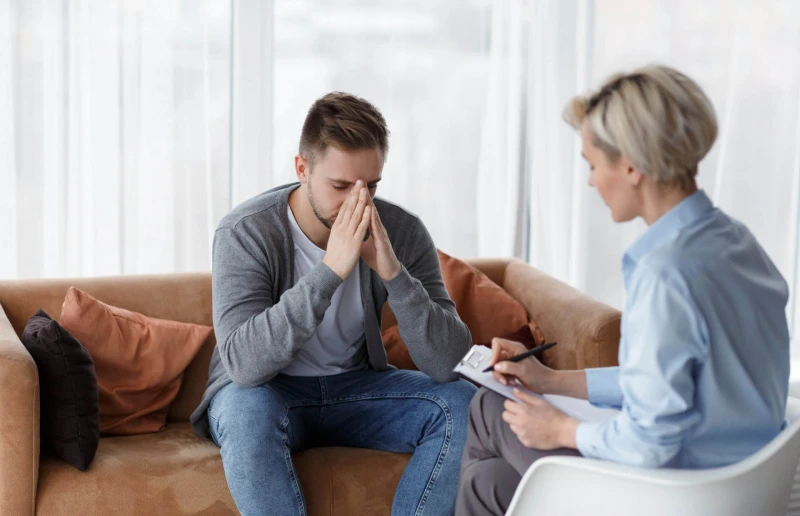Ever felt like you’re balancing on a tightrope, trying to decide whether to pursue individual therapy, couples therapy, or perhaps both? Well, you’re not alone. It’s a common difficulty for many who are on the path of seeking help, whether as individuals or as couples. But fear not, this comprehensive guide will serve as your roadmap. Here, we’ll explore the complexities of both therapies, the unique benefits they offer, and how to distinguish the best approach tailored to your situation. Plus, we’ll demystify the oft-asked question: “Can you pursue couples therapy and individual therapy at the same time?” So, get ready and let’s find out!
Contents
How Couples Therapy Is Different From Individual Therapy?

When navigating the world of mental health support, understanding the distinctions between couples therapy and individual therapy is essential. Both forms of therapy share a common goal: to help improve your well-being. However, the methods and areas of focus differ significantly.
In the realm of couples therapy, the therapist works with two people in a committed relationship. The couple is the “client,” and the purpose is to resolve conflicts, improve relationship satisfaction, and foster mutual understanding. Couples therapy might address issues like communication problems, infidelity, life changes, and other relational stressors. It’s about nurturing the relationship, encouraging healthier interactions, and fostering mutual growth.
On the other hand, individual therapy primarily focuses on the individual – their thoughts, emotions, and behaviors. The therapy is tailored to the person’s unique needs and concerns, which can range from personal growth and self-awareness to coping with life’s challenges such as anxiety, depression, or trauma. The goal is to facilitate personal development and promote healthier psychological functioning.
Both therapeutic approaches play crucial roles in mental health. While they target different areas — the relationship for couples and the individual’s mental health — they can also complement each other effectively. Let’s now delve into the synergy between these two types of therapy.
Benefits of Couples Therapy and Individual Therapy
| Couples Therapy | Individual Therapy |
|---|---|
| 1. Improves communication skills between partners. | 1. Promotes self-awareness and personal growth. |
| 2. Helps resolve relationship conflicts. | 2. Helps manage mental health disorders like anxiety and depression. |
| 3. Strengthens emotional bonds and fosters mutual understanding. | 3. Provides strategies for stress management and coping with life’s challenges. |
| 4. Encourages healthier and more satisfying relationship dynamics. | 4. Offers a safe, confidential space for introspection and emotional processing. |
| 5. Assists in navigating major life changes as a couple. | 5. Facilitates healing from personal traumas or life experiences. |
| 6. Facilitates negotiation and compromise within the relationship. | 6. Boosts self-esteem and confidence. |
| 7. Promotes shared goals and visions for the relationship’s future. | 7. Encourages healthier habits and lifestyle changes. |
Can You Do Couples Therapy With Individual One?
 As we’ve already explored, individual therapy and couples therapy have their unique approaches and benefits. But what about combining them? Can someone truly take advantage of both forms of therapy simultaneously?
As we’ve already explored, individual therapy and couples therapy have their unique approaches and benefits. But what about combining them? Can someone truly take advantage of both forms of therapy simultaneously?
The answer is a resounding yes! The blend of individual and couples therapy is not just feasible but can also be incredibly beneficial. It’s like having the best of both worlds. You get to address personal issues and growth in individual therapy, while simultaneously working on relationship dynamics and mutual understanding in couples therapy. This combination can create a holistic healing environment that caters to both individual and relational needs.
Individual therapy resembles working on a single piece of art. This process allows you to explore your depths, address your personal concerns, and foster personal growth. On the other hand, couples therapy is akin to working on a collaborative art project. It’s about understanding and appreciating your differences, working through conflicts, and creating a beautiful masterpiece that represents your shared vision and goals.
In essence, individual therapy supports your personal development and growth, while couples therapy ensures this growth contributes positively to your relationship, creating a cohesive and harmonious whole.
How To Decide Which Therapy Is Right?

Deciding between individual therapy, couples therapy, or opting for both can seem like a daunting task. After all, each offers unique benefits, as we’ve discussed. The choice ultimately comes down to what suits your needs best, which can be determined by several factors. Here are some guidelines to help you navigate this decision.
What Issues Are Better Treated in Individual Therapy?
Individual therapy is often the go-to option when dealing with personal concerns, such as depression, anxiety, trauma, or any other mental health conditions. It’s also a space to focus on personal growth, self-discovery, and navigating life transitions. If you are dealing with issues that you’d prefer to initially explore alone or if you want to focus on self-improvement, individual therapy might be the perfect fit.
What Are Better Treated in Couples Counseling?
Couples counseling, on the other hand, is the optimal choice for issues directly related to the relationship. This includes things like communication problems, disagreements about significant life decisions, trust issues, or when you and your partner seem to be drifting apart. It’s also a great option if you want to improve your relationship dynamics or build a better understanding with your partner.
Deciding Based on Your Situation
However, the decision isn’t always black and white. For instance, you might be grappling with personal issues that are also impacting your relationship. In such a case, both individual and couples therapy might be beneficial.
Here are a few factors to consider:
- The nature of your issue(s): If they are personal, individual therapy might suffice. If they are relational, couples therapy could be more beneficial. However, if they are both, considering a combination of both therapies might be the best way forward.
- Your comfort level: Some people are more comfortable starting with individual therapy and gradually incorporating couples therapy, while others might prefer to jump straight into couples therapy. Consider what makes you feel most at ease.
- Your therapist’s recommendations: Your therapist is an essential guide in this journey. Discussing your concerns with them can provide valuable insights into the best course of action.
Remember, every person and every relationship is unique. Thus, the best approach will depend on your personal needs and circumstances.
Do I Need The Same Therapist For Couples And Individual Therapy?
 This is an important question and the answer can vary depending on individual preferences and circumstances. Let’s explore the different perspectives on this matter.
This is an important question and the answer can vary depending on individual preferences and circumstances. Let’s explore the different perspectives on this matter.
Having the same therapist for both individual and couples therapy can offer a level of convenience and continuity. The therapist would already be familiar with your personal issues and can potentially provide more integrated care. Additionally, it could lessen the burden of having to repeat your history or context to another professional.
However, there are some considerations that might sway you towards having separate therapists. For one, there can be potential issues of bias or conflict of interest. It might be challenging for a therapist to maintain neutrality in couples therapy if they are also providing individual therapy to one of the partners.
Furthermore, individual therapy is a space where you should feel completely safe to express your deepest thoughts and feelings. If the same therapist is also seeing you and your partner for couples therapy, it might limit what you feel comfortable discussing in individual sessions.
In the end, the decision will largely depend on your personal comfort, the nature of your issues, and the approach of the therapist or therapists involved. It’s a good idea to discuss this matter openly with your therapist to help guide your decision. Trusting your instincts and prioritizing what makes you feel most supported and comfortable is key.
Conclusion
Embarking on the journey of therapy, whether as an individual or a couple, can be a significant step towards healing and growth. In fact, a combination of both can often provide a comprehensive and holistic approach to improving mental health and relationship satisfaction.
Remember, the decision between individual therapy, couples therapy, or both depends largely on your personal needs, comfort level, and the nature of the issues at hand. Whether you choose individual therapy, couples therapy, or a blend of both, the important thing is that you’re taking steps to improve your well-being.
Addressing and resolving a couple of issues is essential for a strong and lasting partnership. If you have any queries regarding Online Couple Counseling experienced therapists at CoupleMantra can help. Book a trial couple therapy session


